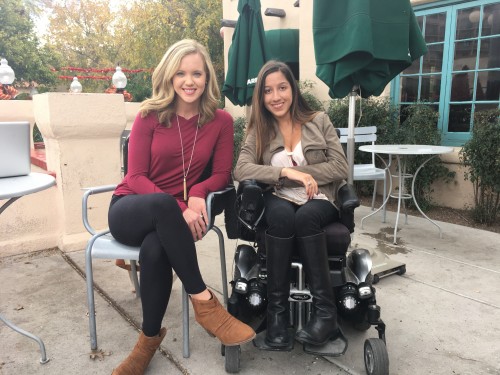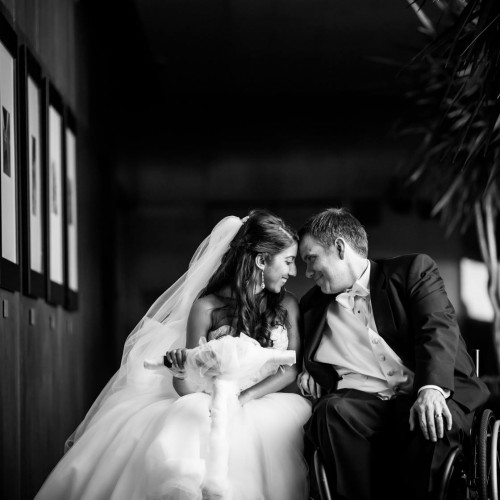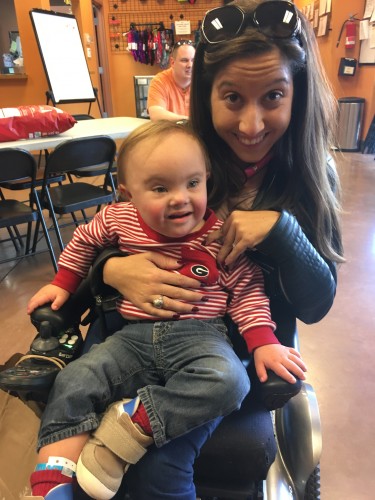
Gaby Ficchi-Bremekamp has embodied the element of surprise since the day she was born. On June 27, 1988, Gaby and her twin sister surprised their parents by coming into this world at 27 weeks gestation. For months after their births, her sister was the one who had more health complications, but when the girls reached 11 months old, the Ficchis noticed Gaby falling behind.
After rounds of tests, doctors diagnosed Gaby with Cerebral Palsy, “Cerebral Palsy was a wastebasket term. It still is.” Cerebral Palsy has a wide range of associated medical issues, for Gaby it affects both of her legs and her left arm. Having heard her diagnosis story many times over her life, Gaby says the doctors told her parents not to expect much out of her. Her mother’s response, “I don’t know how to raise a kid with a disability, so I’m just going to raise a kid.”
Gaby says the first time she noticed she was different was in Kindergarten; she realized she was the only kid who used a walker. Gaby was always in a general education classroom, which her mom constantly fought for, “Looking back, that was the start of kind of what dictated my whole life.”
Although her mother was determined for Gaby to have the same opportunities as her sister and other peers, it took a while for Gaby’s own determination to kick in. She admits she was an average student. That was until she attended her own IEP meeting for the first time. The administrators at her Pennsylvania high school set Gaby on a track to attend trade school, “Even average students are suggested to go to community college,” contends Gaby. But college wasn’t on her IEP team’s radar. They thought Gaby wasn’t being practical with her future, “They thought college was a pipe dream.”
Gaby shocked her teachers and administrators when she told them she was going to go to college in Florida, “The Principal almost laughed it off,” she recalls. It was a defining moment; a fire had ignited, “Once I decided that I was going to do something, you weren’t going to tell me that I wasn’t.”
Her senior year, Gaby went back to her Principal’s office and handed her a college acceptance letter from the Florida college and said, “Next time a student like me tells you they want to go to college, you should at least give them a shot.”
Apparently shocked by her accomplishment, the principal was speechless.
After pulling a 4.0 in college, Gaby is now a dissertation away from earning her PHD in rehabilitation counseling with a focus on mental health. While working towards her PHD, she is also working at the Direct Center for Independence, Tucson, Arizona’s independent living center. If her life wasn’t busy enough, she also found the time to plan a wedding and marry her long-time love. Gaby and her husband Matt both use wheelchairs full-time and live independently with the hope of expanding their family one-day.
Gaby says her high school teachers are still surprised by all she has accomplished, “If I had listened to them, my life would look entirely different right now. It was only possible because my parents believed in me and I believed in me.”
While roommates one night during our Partners for Policymaking course, Gaby changed my world, by inspiring me to change my attitude when approaching my then one-year-old son’s disability. She has the following advice for parents raising children with disabilities.
Let Them Try
Gaby’s main piece of wisdom: let your child try. Too often in her line of work she sees parents who are overprotective, “Parents think that their child’s disability makes their life hard enough and then they just try to make their child’s life easier. But it’s only going to get harder and their child won’t be able to handle life.”
Gaby says studies suggest that when parents are overprotective of their children with disabilities, it tends to affect the child’s maturity level. Gaby says parents make a mistake when they focus too much on the child’s specific issue and not enough on the whole child. She wants parents to embody the independent living principle—the dignity of risk.
“Individuals with disabilities… their dignity is being able to take the risk that anyone else can take.” Gaby says she often sees parents not giving their children the opportunity to fail, “Failure is part of life. Parents don’t let kids with disabilities fail, but I’ve learned so much from my failures.”
It’s Okay to Push
Gaby says parents need to have high expectations, “A child is only going to reach a bar as high as you’re going to set it. It’s okay to push.”
Gaby’s mother pushed her throughout her entire childhood. Educators and friends would often give her mom a hard time for making Gaby work too hard, “But that’s exactly why I’m sitting here telling parents to do the same. So much about what I was able to accomplish was because of how I was raised.”
Gaby recalls her parents pushing her and pushing administrators for inclusive schooling. She encourages other parents to do the same, “What I know of special ed now… again it goes back to that idea of expectations.” She says in her line of work she often times sees special education settings that don’t embrace high expectations for children with disabilities.
She also recalls her parents literally pushing her out of their car to attend a camp for children with disabilities. Gaby refused to leave until Matt (her now husband) greeted her, “I thought, I still don’t want to be here, but he’s cute, so I guess I’ll get out of the car.”
That experience changed her life in not only meeting the man she would eventually spend the rest of her life with, but it also set her on her current career path—focusing on making improving the lives of others with disabilities. It wouldn’t have happened without her parent’s push.

Treat Your Child Like a Typical Child, But Don’t Ignore their Disability
Gaby’s parents didn’t give her any breaks at home. They expected her to contribute to the household responsibilities like the rest of her five siblings; even if it had to look different at times because of her wheelchair.
While her siblings did typical chores after dinnertime, like cleaning the kitchen, Gaby’s mom sat her in front of boxes of pictures with empty photo albums to fill in order for her to earn an allowance.
Although she’s thankful her parents treated her like the rest of her typical siblings, she does wish she had been exposed to more kids with disabilities. Gaby says, as she got older, school became socially harder. Gaby suggests parents find their local independent living centers and other disability organizations to expose their children to other kids with disabilities from a young age.
The Future for Gabby
Gaby’s dream is to run a counseling and rehab program for those with disabilities. Gaby says there are flaws in the rehab/therapy system. She says families get pushed to the back burner and the focus becomes solely on the individual with the disability.
Gaby hopes to shift the tide. Perhaps instead of being surprised, people from her past will now expect her to accomplish her goal, “I was the exception, the way my parents raised me was not the norm. I’m hoping that if parents had better education and supports, we can flip that.”

parenting advice children with disabilities






